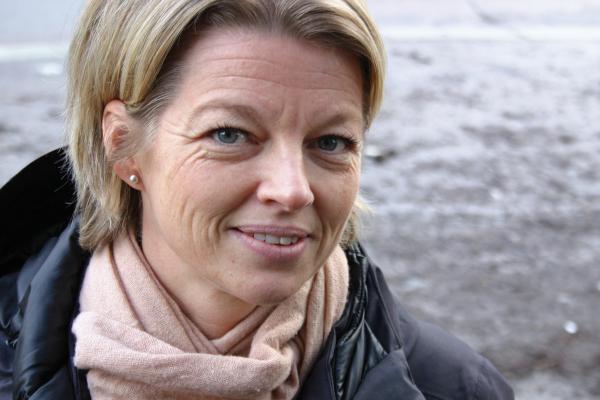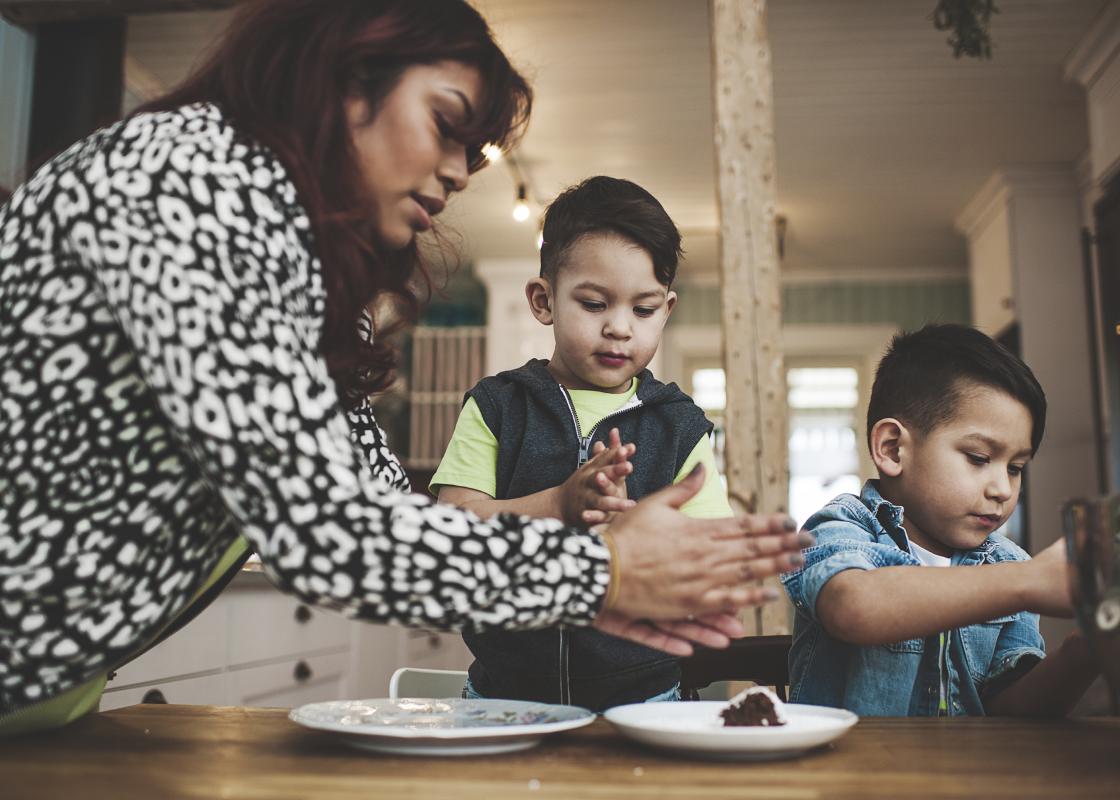“They try to raise sons who will give their future daughters-in-law opportunities they haven’t had themselves. They want things to be different for their daughters and daughters-in-law,” says Ida Erstad.
The Norwegian-Pakistani women she has followed as part of her doctoral work in social anthropology have not been successful on the job market. Some of them have applied to numerous jobs but are always rejected. Then they have children instead. And they are of course responsible for taking care of the house, often overseen by a mother-in-law with opinions on what women should and should not do.
“Some of the men that these women are married to systematically do not contribute in the home. They expect someone else to do that job,” says Erstad.
The conclusion is thus obvious to the women. They need to direct their efforts towards the sons to ensure that they become different men than the ones they’re married to themselves.
Put away their own plate
Erstad’s PhD dissertation is a broad study of Norwegian-Pakistani families with young children based in Alna in Oslo, with particular focus on motherhood. Thirty mothers have been interviewed in addition to some of their men and other family members.
The social anthropologist had not initially envisaged that gender would become such a significant part of her dissertation. But a large majority of the women were so preoccupied with ensuring their daughters and daughters-in-law a more equal life than what they’d had themselves. The daughters’ education is an important step on the road to equality, a step they believe will come naturally. In addition, they were preoccupied with raising a new kind of man.
“In practice, boys as young as the age of two were asked to help out in the house. Fetch things, tidy things, fix things. Get their own bowl of muesli, their own plate, put things away after the meal,” says Erstad.
“The mothers were very conscious in terms of making the boys do things themselves and making them understand that they have to contribute at home.”
It remains to see whether this strategy will ensure their sons’ future wives a more equal life, Erstad points out.
For instance, the fathers did not always agree with the mothers’ strategies. This may cause problems in the upbringing of the children.
“The mothers may ask a three-year-old to tidy up after himself, and he will. But when the boy is six years old and sees that his father doesn’t tidy up after himself, things might get difficult.”
The mothers were very conscious in terms of making the boys do things themselves and making them understand that they have to contribute at home.
Class mobility
“It may seem that the women you’ve interviewed presume that the girls’ lives will be regulated by the boys they marry in the future. It doesn’t particularly challenge the idea of the male head of the family. Was this something they reflected upon at all?”
“Yes and no. They didn’t want an all-Norwegian family model with an equal husband and wife where both have jobs and divide all the housework equally. They also wanted to pursue aspects of their own family background. That is why I refer to what happens in these families as a shift rather than an upheaval,” says Erstad.
“If it is ‘only’ a shift it doesn’t require the same amount of self-reflection, since the process is slow and gradual. You don’t need to decide upon the result in advance, the result evolves as you go.”
“Other Norwegian research on Norwegian-Pakistani women has found that descendants of immigrants ‘choose equality’, that they want a more equal life for themselves and their children than what their mothers had. Is it fair to say that you’ve found the same trend in your own research?”
“I would probably say that they choose mobility rather than equality,” Erstad replies.
“Parts of this research is about middle-class women. I have several working-class families in my material. They want equality because it involves socio-economic mobility.”
Read also: Children of immigrants choose gender equality
Community and individualism
The mothers that Erstad has interviewed wish to stay at home with their children longer than what is common in many ethnic Norwegian families. But they also have a desire to work, preferably in a job that can be easily combined with having the main responsibility for the children.
Strong family ties are important to them, but at the same time they wish to be less tied by these than their own mothers were or than their own mothers-in-law want them to be. They want fewer children than their parental generation, and they think gender is less important. It doesn’t matter whether they have boys or girls.
“In this sense, we may definitely say that they are on their way towards increased equality or perhaps individualisation,” says Erstad.
“They want to be less tied to their family and more their own individual person. They’re not necessarily very suppressed by their family, but some duties could be less binding. The women want to decide themselves what is important and when. And they’d prefer a man who knows how to wash the floor.”
At the same time, many benefit from the help they get from others such as their mother-in-law. Living with the in-laws provides the opportunity to save up money for their own house. When the husband doesn’t help out, the in-laws can give a helping hand and let the woman resit the exams she lacks from upper secondary school in order to get an education.
“In one way, the ties they want to cut can also be a major resource,” Erstad explains.

Class, not migration
Erstad’s informants are a mix of women who are born and raised in Norway and women who moved to Norway in their adult life to marry. They have all lived in Norway for at least seven years, and they all speak Norwegian.
But the differences between the women have nothing to do with whether they’re born in Norway or not. Class is the crucial factor.
“Those who are born and raised in Norway do not necessarily have stronger ambitions to work than those who move here,” says Erstad.
“Those who don’t belong to the middle class rarely have higher education, and they struggle to make their way on the job market. They might not actively apply for work or they have had numerous rejections. It is a difficult situation for them.”
A larger amount of the women who moved to Norway is working than those who are born and raised here.
“They often come here as adults. The family in Norway may have consciously thought that they want to find a woman with opportunities for participation on the job market. Moreover, migration itself might have given the women an ambition to climb the class ladder and enter the job market.”
Within the few families from the middle class in Erstad’s material, work and everyday life is organised differently than within the working class families. The class distinction is made according to the level of education within the families.
“When both parts are born and raised in Norway and one of them is a doctor and the other an engineer, they want a different kind of gender equality and organise their lives differently. In those families transnational marriages weren’t as common.”
Those who are born and raised in Norway do not necessarily have stronger ambitions to work than those who move here.
See also: Daughters ignored as leaders of the family business
Educational journey to Pakistan
To many of those born and raised in Norway, the ties to Pakistan are important. But a shift has occurred here as well, according to Erstad.
“Many of them spent long periods in Pakistan while growing up. Some were there for two-three years, they went to school there, or they just lived there for a period during childhood. Most of them have ambivalent memories from this experience. Both being in Pakistan and coming home to Norway was difficult.”
Therefore, they want something different for their own children. A connection to Pakistan, but more focus on education and culture than on maintaining family relations.
“They go back on holidays relatively often, but for shorter periods of time. And it’s important for them that this happens during school holidays,” says Erstad.
“And they don’t just sit there with the family when they’re there, they experience Pakistan as tourists. The see the sights and explore their roots. These journeys will provide important perspectives that they will bring home to Norway. And then they may stop in Dubai on their way home for a little beach holiday.”
The mothers that Erstad has interviewed think that growing up in Norway provides great opportunities for their children in terms of education and socio-economic mobility.
“Many have great respect and gratitude for the situation they’re in and that they’re able to give their children, both boys and girls, the opportunities they didn’t get or had access to themselves.”
Cash benefit provided economic leeway
A surprising discovery for Erstad was that cash benefit provided the women with economic freedom.
Most of the mothers received cash benefit during some periods. This is a cash-for-care benefit for parents who choose to stay at home with their children during the first years. However, Erstad does not think this has had anything to do with the fact that they didn’t work.
“Many of them would have stayed at home regardless of whether they received cash benefit or not. In this respect, cash benefit is a good thing, as both that and child benefit are allowances that go directly to her in many of the families. Some of the women keep this money in their own bank accounts that their husbands don’t have access to. ”
When cash benefit is regarded as the woman’s own money, it provides economic leeway, according to Erstad. Additionally, the money is regarded as an appreciation of the job they do at home.
“Most of them live in gender complementary relationships where the husband is the provider while the wife is responsible for the children. Having responsibility for the children make them feel valued. It is their way of contributing to society by raising the nation’s citizens in the best possible way. The cash benefit is their payment for doing that job.”
If these women had to send their children to kindergarten, which costs money, in addition to not being successful on the job market themselves, they would have been in a much more vulnerable and financially dependent position, according to the researcher.
Most of the women in Erstad’s research do not qualify for other benefits. Unemployment benefit, for instance, is linked to previous paid employment, which many of them don’t have.
The mothers that Erstad has interviewed think that growing up in Norway provides great opportunities for their children in terms of education and socio-economic mobility.
More diversity and access to jobs
“Integration is a hot topic in these times of refugee crisis. How can your research contribute to this debate and to the integration work?”
“Anthropology shows that people live complex lives. They are creative and eclectic in terms of how they organise their everyday life. Perhaps we should allow for other ways of participating in society that don’t just revolve around paid work and paying taxes. For instance, raising children creates a sense of belonging to society.”
“Another problem is that these women actually want to participate on the job market, but they don’t succeed. Many get work through networks, but these women don’t have that. This is a societal challenge which is difficult for them to solve on their own.”
A major part of Erstad’s study also looks at the significance of public institutions and their role in the Norwegian-Pakistani families’ lives. Parts of the study show that the employees at these institutions have a different attitude towards ethnic Norwegian families, who are equal in the right way, and immigrant families whom they perceive as more problematic and in need of more help, support, and intervention.
But Erstad also finds that employees at health stations and kindergartens do a lot of things right, and put in the little extra that is needed.
“These child raising institutions are important in order to bring people together. They take integration seriously and create a community through parenthood and young children.”
Translated by: Cathinka Dahl Hambro



